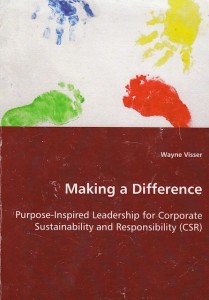The Meaning of Responsibility
Blog by Wayne Visser
Part 1 of 13 in Wayne Visser’s Age of Responsibility Blog Series for 3BL Media.
Do you sigh when you hear the word responsibility? Perhaps responsibility is even a dirty word in your vocabulary. Perhaps you associate it with burdens and restrictions; the opposite of being carefree and without obligations. But responsibility doesn’t have to be a chore, or a cage. It all depends how you think about it.
Responsibility is literally what it says – our ability to respond. It is a choice we make – whether to be attentive to our children’s needs, whether to be mindful of the plight of those less fortunate, whether to be considerate of the impact we have on the earth and others. To be responsible is to be proactive in the world, to be sensitive to the interconnections, and to be willing to do something constructive, as a way of giving back.
Responsibility is the counterbalance to rights. If we enjoy the right to freedom, it is because we accept our responsibility not to harm or harass others. If we expect the right to fair treatment, we have a responsibility to respect the rule of law and honour the principle of reciprocity. If we believe in the right to have our basic needs met, we have the responsibility to respond when poverty denies those rights to others.
Taking responsibility, at home or in the workplace, is an expression of confidence in our own abilities, a chance to test our own limits, to challenge ourselves and to see how far we can go. Responsibility is the gateway to achievement. And achievement is the path to growth. Being responsible for something means that we are entrusted with realising its potential, turning its promise into reality. We are the magicians of manifestation, ready to prove to ourselves and to others what can happen when we put our minds to it, if we focus our energies and concentrate our efforts.
Being responsible for someone – another person – is an even greater privilege, for it means that we are embracing our role as caregivers, helping others to develop and flourish. This is an awesome responsibility, in the truest sense, one which should be embraced with gratitude, not reluctantly accepted with trepidation. Responsibility asks no more of us than that we try our best, that we act in the highest and truest way we know. Responsibility is not a guarantee of success, but a commitment to trying.
So why is responsibility seen by many as such an onerous burden? Responsibility becomes onerous when choice is removed from the equation, when we do not realise our freedom to act differently, when we forget that we are allowed to say no. Responsibility becomes pernicious when we take on too much, when we mistakenly think that more is always better, when we take on the guilt and expectations of others. Accepting too many responsibilities is, in fact, irresponsible – for it compromises our ability to respond. Do few things but do them well is the maxim of responsibility.
Being responsible also does not mean doing it all ourselves. Responsibility is a form of sharing, a way of recognising that we’re all in this together. Sole responsibility is an oxymoron …
Continue reading
[button size=”small” color=”blue” style=”download” new_window=”false” link=”http://www.waynevisser.com/wp-content/uploads/2012/04/blog_meaning_responsibility_wvisser.pdf”]Pdf[/button] The Meaning of Responsibility (blog)
Related websites
[button size=”small” color=”blue” style=”info” new_window=”false” link=”http://www.csrinternational.org/”]Website[/button] CSR International (website)
[button size=”small” color=”blue” style=”tick” new_window=”false” link=”http://www.waynevisser.com/books/the-age-of-responsibility”]Page[/button] The Age of Responsibility (book)
Cite this blog
Visser, W. (2012) The Meaning of Responsibility, Wayne Visser Blog Briefing, 7 February 2012.




